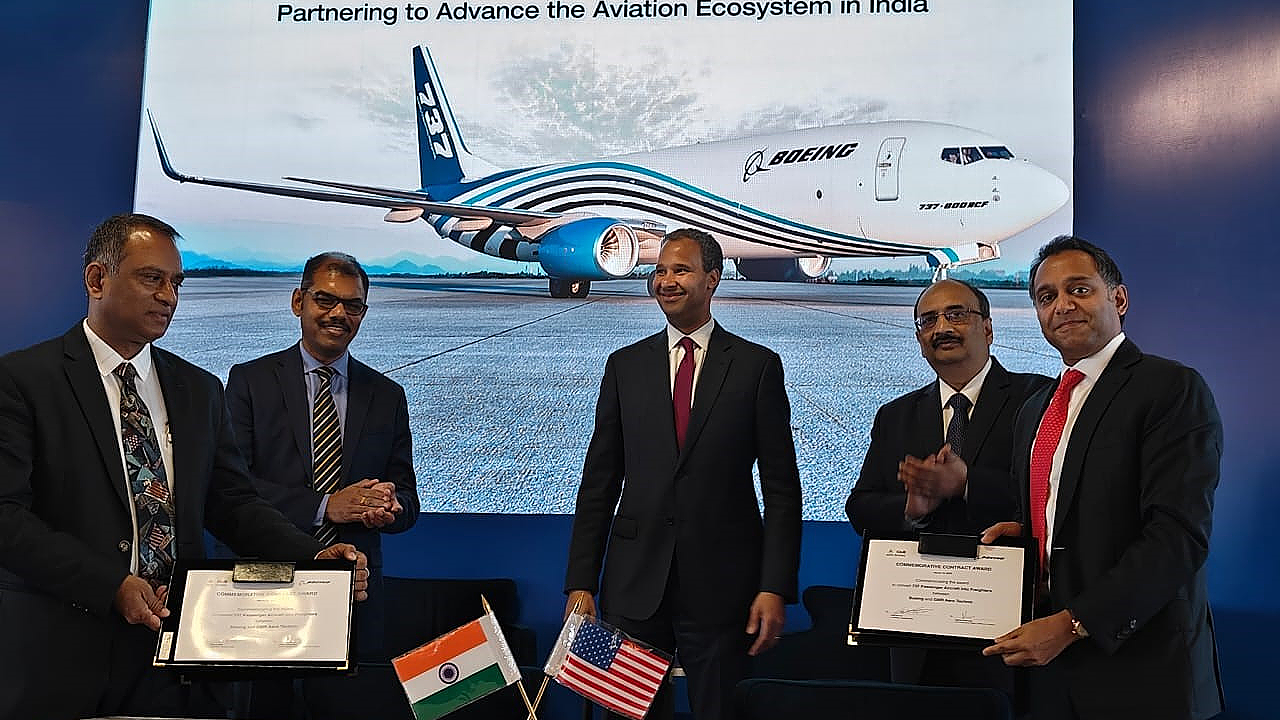
Boeing India and GMR Technic on Friday entered into an agreement to convert Boeing 737 passenger aircraft to freighter 737 BCF in Hyderabad. Marc Allen, Chief Strategy Officer, Boeing, labels this step as the next phase for the 75 years of relationship between Boeing and India.
Speaking to Mobility Outlook, Ashok Gopinath, Chief Executive Officer, GMR Aero Technic, stated that the partnership will take nearly 18 months to get fully operational. Until then, the technicians' training will take place under the supervision of Boeing officials.
He added that the average time to convert the narrow body from passenger carrier to cargo carrier will be 100 days, and the team will follow the defined pattern set by the Boeing engineers globally. Interestingly, the Indian MRO facility will cater to the conversion of aircraft in the Asia Pacific region, which according to Salil Gupte, President, Boeing India, will be around 600 narrow-body aircraft in the next 20 years.
“Our cooperation with GMR Aero Technic is not only a testimony of the maturation of Indian MROs in the country to support the vision of Aatmanirbhar Bharat, but also supports the anticipated growth of the cargo sector in the region,” the Boeing India President added.
Gopinath noted, “With the rise in the Indian aviation industry, MRO services in India have been one of the fastest-growing markets globally.”
Gupte noted that India has envisioned itself as a global cargo hub, and Boeing is well placed to aid the country in achieving its target. As India is seeing structural shifts, growth in exports and electronics manufacturing, he believes that the cargo segment growth in the country is here to stay.
According to Boeing’s commercial market outlook, India’s air cargo growth is expected to average 6.3% annually, driven by its manufacturing and e-commerce sectors, including its Make in India initiative. Boeing forecasts demand for more than 75 freighters, including production and converted freighters.
Going ahead, as the MRO company is already familiar with maintaining other narrow body aircrafts such as the Airbus A320 family, Gopinath noted that the facility in Hyderabad can convert these aircraft as well to freight while the company is also looking at increasing its capacity both in enhancing the numbers and adding newer wide-body aircraft as well.
Supplier Base For Boeing From India
The Boeing India President believes that the final assembly of an aircraft is less than 10% of the total valuation of the aircraft. He noted that the supply chain's complexity and maturity are the real identities of a progressing market, and India has been progressing well in the last couple of years.
Ashwani Bhargava, Senior Director- India Supply Chain, Boeing, told Mobility Outlook that in the aerospace industry, quality and delivery are mandatory while cost is secondary. Therefore, the key in the industry is to go beyond cost and present something beyond that, which can be automation, redesigning of the parts or productivity as the supply chain players in the field compete with the global players.
Interestingly, the Indian players are lately showcasing a lot of automation, redesigning and innovation for the industry while also delivering the required quality, he added. With huge order book by the Indian airlines, the key is to develop a broader ecosystem to manufacture parts.
India supplies the fuselages for its Apache helicopters, while recently, the Tata Boeing JV and Tata Boeing Aerospace shipped the first vertical fin structure for Boeing 737 aircraft from its Hyderabad plant.
Bhargava stated that about five years back, India was considered a country to supply simpler parts, but now India is supplying one of the most complex aerospace parts to the world. Going forward, the country has the opportunity to up the value curve and value chain vertically and horizontally by going from simple structures to complex structures and looking at aircraft interiors and forging as a growth opportunity.
Also Read